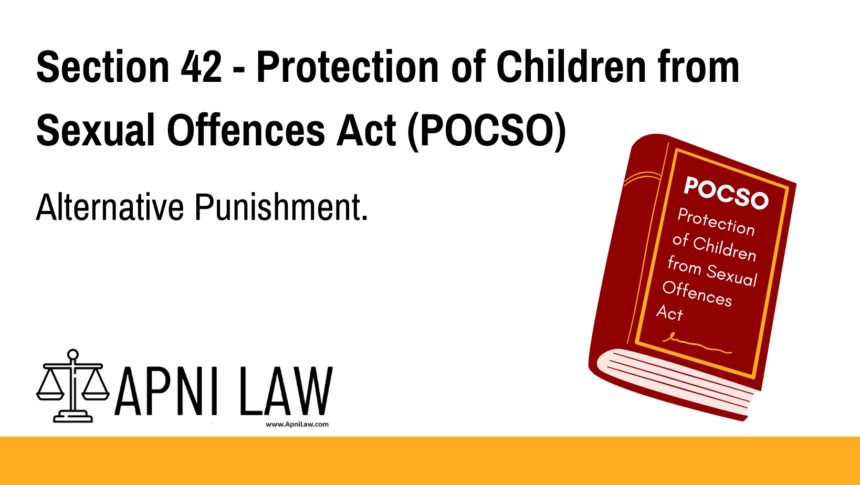Code: Section 42 – Alternative Punishment
42. Alternate punishment.
Where an act or omission constitutes an offence punishable under this Act and also under sections 166A, 354A, 354B, 354C, 354D, 370, 370A, 375, 376, 376A, 376AB, 376B, 376C, 376D, 376DA, 376DB, 376E, section 509 of the Indian Penal Code, or section 67B of the Information Technology Act, 2000 (21 of 2000), then, notwithstanding anything contained in any law for the time being in force, the offender found guilty of such offence shall be liable to punishment only under this Act or under the Indian Penal Code, whichever provides for a punishment that is greater in degree.
Explanation of Section 42 POCSO Act
Section 42 of the Protection of Children from Sexual Offences (POCSO) Act provides a critical provision for cases where an offence under this Act may also fall under other sections of the Indian Penal Code (IPC) or the Information Technology Act. In such cases, the offender will be punished under the law that prescribes the greater punishment.
Key Points:
- Overlap of Offences: If an act under POCSO also constitutes an offence under other IPC sections or the IT Act, both laws can apply.
- Greater Punishment: The offender is liable to the punishment under the Act that imposes the greater penalty.
- No Double Punishment: The provision ensures that an individual is not punished twice for the same act under different sections, though they may face harsher penalties under the more severe law.
Relevant Offences:
- Section 166A: Public servant disobeying law
- Sections 354A – 354D: Sexual harassment and assault
- Section 370 and 370A: Trafficking of persons
- Sections 375, 376, 376A, 376AB, etc.: Rape and related offences
- Section 509 IPC: Word, gesture or act intended to insult the modesty of a woman
- Section 67B of IT Act: Punishment for publishing child sexual abuse material
Illustration
Example 1: Sexual Assault and POCSO
A person is found guilty of sexual assault under Section 354A of the IPC and also under Section 7 of the POCSO Act. Since the POCSO Act generally has a more severe punishment for child-related offences, the offender will be sentenced under the POCSO Act, which provides a harsher penalty.
Example 2: Child Trafficking and POCSO
An individual is found guilty of trafficking a child under Section 370 of the IPC and also under the POCSO Act. Since the punishment under Section 370 (for trafficking) is severe, the person will be punished under the IPC provisions for trafficking.
Common Questions and Answers on Section 42 POCSO Act
1. Can an offender be punished under both the POCSO Act and IPC for the same act?
- Answer: No, an offender can only be punished under the law that prescribes the greater penalty for the offence, even if the same act violates provisions under both the POCSO Act and IPC.
2. Does Section 42 eliminate the possibility of being punished for an offence under both laws?
- Answer: Yes, Section 42 ensures that the offender faces only the greater punishment under either the POCSO Act or the Indian Penal Code, depending on which law prescribes a higher penalty.
3. Which law takes precedence in the case of overlapping offences?
- Answer: In cases where an offence is punishable under both the POCSO Act and the IPC, the law with the more severe punishment will take precedence.
Conclusion
Section 42 of the Protection of Children from Sexual Offences Act (POCSO) ensures that offenders who are found guilty of overlapping offences under the POCSO Act and the Indian Penal Code are only liable for punishment under the law that provides for the greater penalty. This provision streamlines the legal process and avoids double jeopardy, ensuring that offenders face an appropriate punishment for their crimes, especially in cases involving sexual offences against children.
For more details, visit the official Protection of Children from Sexual Offences Act.








